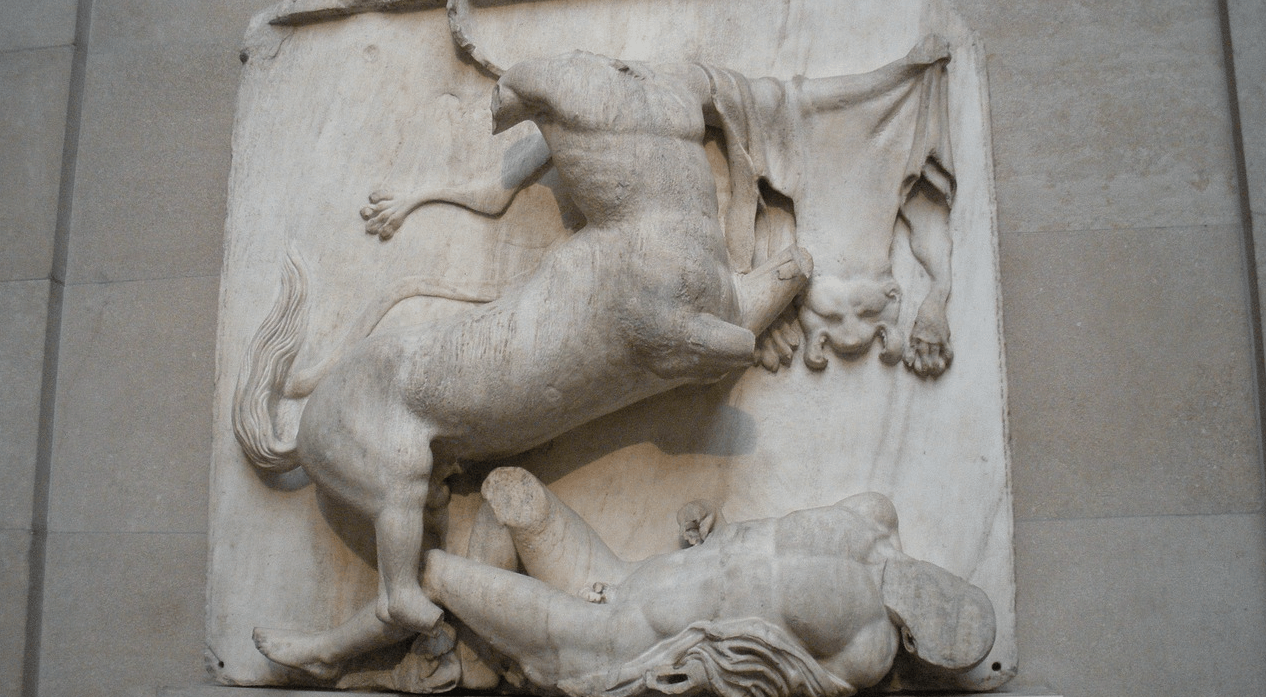British Looting, Revisited
Few plunders by Western countries are more glaring than Britain’s looting of the Parthenon marbles from Greece’s Acropolis.
September 3, 2023

A Global Ideas Center, Strategic Assessment Memo (SAM) from the Global Ideas Center
You may quote from this text, provided you mention the name of the author and reference it as a new Global Ideas Center, Strategic Assessment Memo (SAM) published by the Global Ideas Center in Berlin on The Globalist.
A global campaign is under way for Western countries to return cultural items to their rightful homes. Germany, for example, has been making some efforts in that direction, returning some Benin bronzes to Nigeria late last year.
Meanwhile, the UK tries as hard as it can to keep mum about the venerable British Museum’s biggest stolen art collection: The 2,500-year-old “Elgin Marbles.“
The collection is named after Lord Elgin – the man who shamefully plundered the artefacts from the Parthenon in Ottoman Greece between 1801 and 1811 and brought them to Britain.
Trying to whitewash history
In an effort to detract from the brazen looter, they are now officially known as the “Parthenon Marbles.” You can read more on the British Museum’s attempt at defending its untenable position on its website.
The marbles were all sawn or hacked off with axes in the early 19th century by Lord Elgin, a syphilitic Tory minor aristocrat. He claimed at the time that he had written permission from the Turkish occupiers of Athens, but there is no evidence of any such document.
In any case, it would have as much validity as an authorization issued in the Second World War by a German Kommandant in occupied France to some foreigner who wanted to steal priceless French art.
Elgin bribed local officials to allow his workmen to vandalize the front of the Parthenon. He brought the friezes and other components of the founding moment in European art back to Britain. Of course, he was dutifully helped by the Royal Navy, then at the height of its imperial arrogance.
Needing money for a divorce, Elgin sold them to the British government, and ministers and professors have defended the looting and plunder ever since.
The biggest act of cultural vandalism in European history
Indeed, the marbles have an extraordinary hold over Britain’s establishment. Perfectly sensible, cultivated professors and those in charge of culture on behalf of the government go weak at the knees at any suggestion that Britain might make good the biggest act of imperial looting and cultural vandalism in British, and indeed European history.
At the start of the Tony Blair government in 1997, I was serving as the UK’s Europe Minister and I found myself in a car with the newly appointed Culture Secretary, Chris Smith. He was an old friend, of the same generation that hitchhiked to Greece in the 1960s as students. We had been in awe at the glory of the buildings and sculptures in the birthplace of European civilization, philosophy, theater and democracy.
It was widely assumed at the time that the conservative governments of James Callaghan, Margaret Thatcher and John Major were forever in the dustbin of history. The brave and bold New Labour government would agree with the anglophile film star and Greece’s stellar Culture Minister Melina Mercouri that the marbles should go home to where they belonged.
I asked Chris what arrangements would be made for their return. He froze in terror. “Please, please Denis, do not bring up the marbles in parliament and don’t mention your interest to anyone at No. 10,” he said.
Blair, the great elite seductionist
Chris did not have to spell out why. Blair’s success was in part based on his brilliant seduction of the establishment, known as “the blob.” The military loved him because he kept giving them campaigns to fight and win such as in Kosovo, Sierra Leone or East Timor.
The City loved him because he made them all much richer. And Rupert Murdoch loved him because Blair refused to contemplate fully entering the European Union without first holding a referendum on the Euro – which everyone in Whitehall knew wouldn’t happen.
And Smith knew that if he went to Blair and asked about returning the marbles his ministerial career would soon end.
Mum to this day
No one knows who the UK’s current Culture Minister is. He or she has no national profile. Yes, there is a polite campaign for a return of the marbles, but the proponents of such a move have found it hard to get a hearing from future Labour ministers.
And Labour has been strangely silent in demanding action over the thefts, despite the British Museum’s board being packed with super-rich business leaders close enough to the Tory party and headed by George Osborne, a former Tory chancellor who imposed austerity on Britain and presided over the country’s worst decade of economic performance in centuries.
Greece: A modern democracy
Greece is now a solidly rooted democracy and deserves to be treated with respect. London has few friends in the European Union, but the re-elected center-right government of Greece has many.
Many suggestions have been made to find solutions using the incredible AI capacity of modern archaeology to reunite the illegal London marbles back to where they belong, while bringing a new flow of Hellenistic artefacts to London – the very copies the Greeks created and are now displaying in the ultra-modern Acropolis Museum.
It surely would be the right thing to do. But strong doubts are in order whether the UK establishment ever arrives at the level of moral rectitude required to finally reverse the greatest act of cultural looting in European history.
Takeaways
Amidst a global campaign for Western countries to return cultural items to their rightful homes, few plunders are more glaring than that of Britain’s looting of the Parthenon marbles.
The UK tries as hard as it can to keep mum about the venerable British Museum’s biggest stolen art collection: The 2,500-year-old “Elgin Marbles.“
The “Elgin Marbles” are named after Lord Elgin – the man who shamefully plundered the artefacts from the Parthenon in Ottoman Greece between 1801 and 1811 and brought them to Britain.
Greece is now a solid democracy and deserves to be treated with respect. London has few friends in the EU but Greece has many.
Strong doubts are in order whether the UK establishment ever arrives at the level of moral rectitude required to finally reverse the greatest act of cultural looting in European history.
A Global Ideas Center, Strategic Assessment Memo (SAM) from the Global Ideas Center
You may quote from this text, provided you mention the name of the author and reference it as a new Global Ideas Center, Strategic Assessment Memo (SAM) published by the Global Ideas Center in Berlin on The Globalist.


